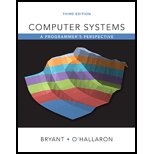
A)
Explanation of Solution
Cache entry and cache byte:
The program running on a machine references the 1-byte word at address “Ox0DD5”. Hexadecimal is a number system of base 16As and as hex system has 16 digits, the extra needed 6 digits are represented by the first 6 letters of English alphabet which means “ 0,1,2,3,4,5,6,7,8” represents “9,A,?B,?C,?D,?E,?F” respectively in decimal system.
First, one needs to convert the hexadecimal address into binary form:
One needs to consider the following set associative (S, E, B, m) = (8, 4, 4, 13). The derived value will be as follows:
The Index (CI):
B)
Explanation of Solution
Memory reference:
The address format (1 bit per box) for address “Ox0DD5” is hence represented as:
| CT | CT | CT | CT | CT | CT | CT | CT | CI | CI | CI | CO | CO |
| 0 | 1 | 1 | 0 | 1 | 1 | 1 | 0 | 1 | 0 | 1 | 0 | 1 |
Want to see the full answer?
Check out a sample textbook solution
Chapter 6 Solutions
Computer Systems: A Programmer's Perspective (3rd Edition)
 C++ for Engineers and ScientistsComputer ScienceISBN:9781133187844Author:Bronson, Gary J.Publisher:Course Technology Ptr
C++ for Engineers and ScientistsComputer ScienceISBN:9781133187844Author:Bronson, Gary J.Publisher:Course Technology Ptr Systems ArchitectureComputer ScienceISBN:9781305080195Author:Stephen D. BurdPublisher:Cengage Learning
Systems ArchitectureComputer ScienceISBN:9781305080195Author:Stephen D. BurdPublisher:Cengage Learning Principles of Information Systems (MindTap Course...Computer ScienceISBN:9781285867168Author:Ralph Stair, George ReynoldsPublisher:Cengage Learning
Principles of Information Systems (MindTap Course...Computer ScienceISBN:9781285867168Author:Ralph Stair, George ReynoldsPublisher:Cengage Learning Principles of Information Systems (MindTap Course...Computer ScienceISBN:9781305971776Author:Ralph Stair, George ReynoldsPublisher:Cengage Learning
Principles of Information Systems (MindTap Course...Computer ScienceISBN:9781305971776Author:Ralph Stair, George ReynoldsPublisher:Cengage Learning Enhanced Discovering Computers 2017 (Shelly Cashm...Computer ScienceISBN:9781305657458Author:Misty E. Vermaat, Susan L. Sebok, Steven M. Freund, Mark Frydenberg, Jennifer T. CampbellPublisher:Cengage Learning
Enhanced Discovering Computers 2017 (Shelly Cashm...Computer ScienceISBN:9781305657458Author:Misty E. Vermaat, Susan L. Sebok, Steven M. Freund, Mark Frydenberg, Jennifer T. CampbellPublisher:Cengage Learning C++ Programming: From Problem Analysis to Program...Computer ScienceISBN:9781337102087Author:D. S. MalikPublisher:Cengage Learning
C++ Programming: From Problem Analysis to Program...Computer ScienceISBN:9781337102087Author:D. S. MalikPublisher:Cengage Learning





